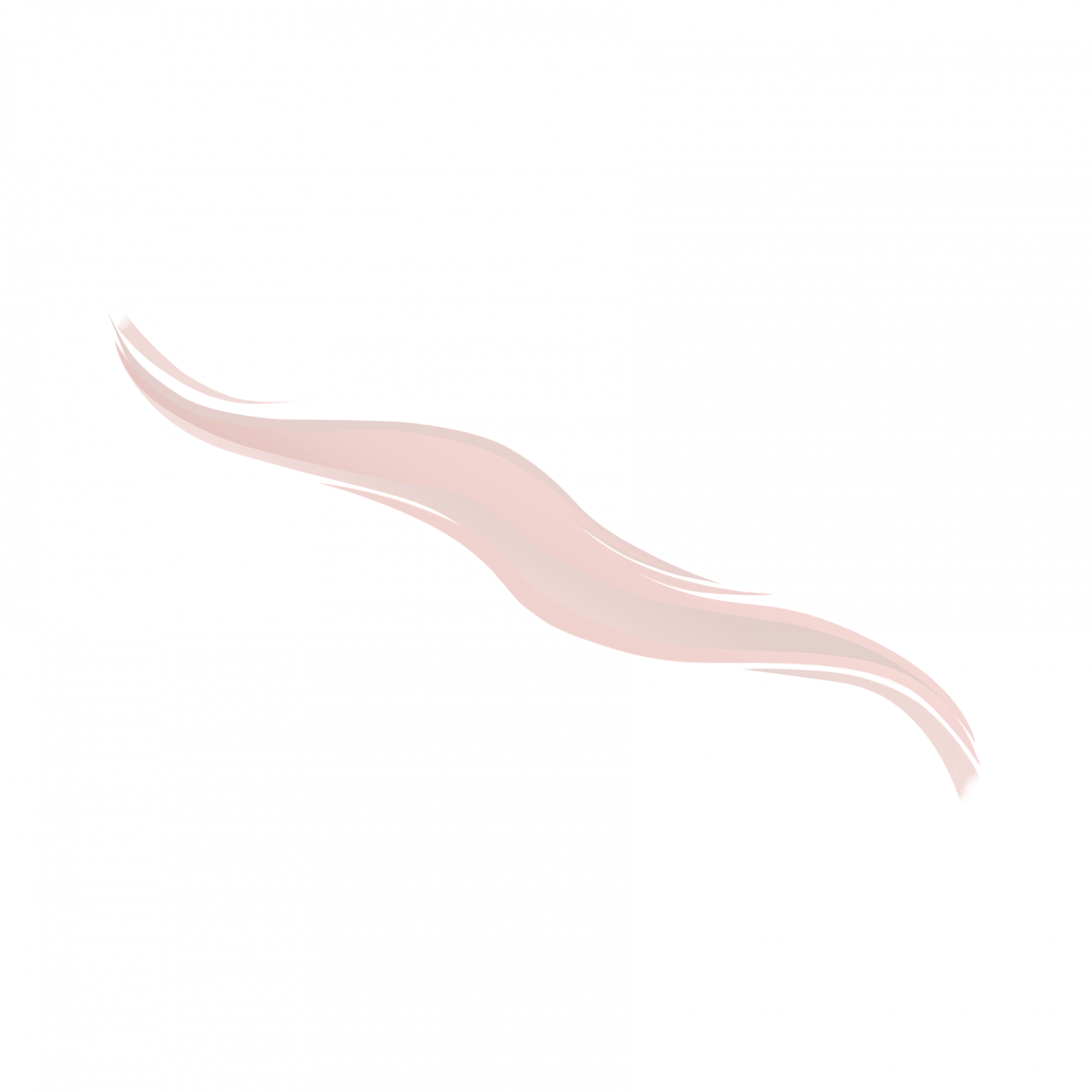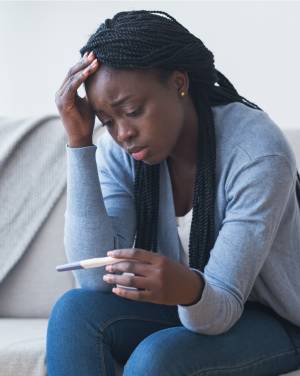Can You Be Pregnant and Still Have Your Period?
- Menstruation is a sure sign that you are not pregnant.
- Not every kind of vaginal bleeding is menstrual.
- Some forms of period-like bleeding (such as implantation bleeding) can be signs of pregnancy.
Can You Get Your Period If You Are Pregnant?
The short answer is: No. If you are really on your period, you cannot be pregnant — BUT it is possible to experience menstrual-like bleeding during pregnancy.
Any vaginal bleeding other than menstrual bleeding is often referred to as breakthrough or intermenstrual bleeding. It is usually weaker than menstrual bleeding (many women describe it as "spotting"). It often ceases after only one day.
ℹ️ Pregnant and bleeding: Approximately one in five women experience spotting in early pregnancy. This is definitely not a menstrual period since pregnancy and menstrual bleeding are mutually exclusive.
-
Am I Pregnant?
Analyze Your Symptoms
Short, Very Early, or Light Period — A Sign of Pregnancy?
If your period came sooner than usual (perhaps three, four, or multiple days earlier), lasted only a few days, or wasn’t as strong, this does not necessarily mean that you are pregnant. Even women with relatively regular cycles may experience shifts in timing or intensity. Some women have lighter periods than others.
Nevertheless, it may be that the bleeding was not your menstruation but breakthrough bleeding. Consult your doctor if you are concerned about other symptoms that could point toward a pregnancy.
- 🤔 Wondering if you are showing further signs of pregnancy? Read more here!
- 💊 Wondering whether the morning-after pill would work for you? Take the Morning-After Pill Test.
Possible Causes of Vaginal Bleeding During Pregnancy
Vaginal bleeding, also known as breakthrough bleeding, at the beginning of pregnancy can have many causes. Although usually harmless, it is reason enough to consult a doctor. The amount of blood alone is not a sufficient indicator of the seriousness of the situation.
Here are some of the reasons for spotting while pregnant:
- Implantation bleeding: Five to six days after fertilization, small blood vessels sometimes rupture when the fertilized egg attaches to the lining of the uterus. This results in bright red spotting/implantation bleeding. Spotting during implantation takes place just before one’s period would be due.
- Hormonal changes in early pregnancy can cause light bleeding. This so-called "pseudo menstruation" is caused by altered estrogen levels. Some women even have regular pseudo menstruations, blinding them from the realization that they are actually pregnant.
- Infections of the vagina or cervix can also cause bleeding.
- Vaginal exams or sexual intercourse can lead to contact bleeding because of the rupturing of small blood vessels in or around the vagina.
Difference Between Period and Spotting
How do you identify the difference between menstrual bleeding and breakthrough bleeding or spotting?
Preparation by Progesterone
After the egg cell is released into the fallopian tube (ovulation), the female body assumes that the egg will be fertilized and a new life is about to begin. Progesterone, a hormone that enables the body to accommodate the fertilized egg perfectly, is produced in preparation. This leads to the thickening of the uterine lining.
The Uterine Lining is Expelled through Bleeding
If no fertilized egg implants in the uterus within the following days, progesterone levels decrease. Since no new life has been created, the nutrients contained within the endometrium are not needed. Consequently, the endometrium, the lining of the uterus, is excreted in the form of blood and small pieces of tissue.
Menstrual bleeding is usually heavier than any breakthrough bleeding.
Unlike menstrual bleeding, spotting is usually due to hormonal fluctuations.
This intermenstrual bleeding can even occur during your fertile window and may cover up other signs of fertility (such as increased cervical mucus).
It is possible to become pregnant during this time!
Ovulation Bleeding
Ovulation can cause spotting. This light bleeding in the middle of one’s cycle is known as ovulation bleeding. It is caused by a shift in hormone levels during ovulation.
Why Pregnancy and Period Are Mutually Exclusive:
If the egg is fertilized, it implants in the uterus about six days later. At this point, the body starts producing the pregnancy hormone, human chorionic gonadotropin (hCG). This is what is detected by a home pregnancy test. HGC ensures that progesterone continues to perform its tasks diligently over the next nine months.
The lining of the uterus, already prepared before implantation, continues to thicken. Simultaneously, the placenta, responsible for the baby’s nourishment and protection, starts to develop. At the same time, the cervix is sealed by a plug of mucus.
Rather than cleaning out the “biological hotel room,” as during menstruation, it is now newly furnished. Therefore, a pregnant woman cannot have a period.
Am I Pregnant While Spotting?
You probably got to this page because some of these topics have hit a nerve. If you are wondering where to go from here, these suggestions may be helpful:
If you are pregnant and are experiencing any bleeding or spotting, seek medical advice immediately.
If you had not suspected a pregnancy until now because of your period-like bleeding, you may want to know, "How can I tell if I am pregnant?"
- 🤰 Feel free to take our Online Pregnancy Test and describe your symptoms and observations. You will receive a personal, detailed evaluation.
- You can also take a regular home pregnancy test or see your doctor to gain certainty.
Women Share Their Stories
Ascielle's comment on our German forum | 11/19/2014
..."Today, I am still spotting, but without pain. It is starting to feel and look like a regular period; it is just as strong now..."
Miniko08's comment on our German forum | 02/05/2017
"12/27 (Tuesday) was the last time I had sex (on the pill). On Wednesday, I had to take antibiotics. My 'period'(?) started on Friday. The bleeding was on the light side. The next month my 'period'(?) was so light, it could have been spotting... It lasted the full six days, and the color of my blood was sometimes red and sometimes brown... but it was a lot lighter than usual."...
Curlysuu85's comment on our German forum | 08/07/2019
..."My period has been super regular for years — ALWAYS on the 10th. No changes. My period started today. It was very different from my normal period: very light, reddish-brown, and no pain...
...Could this spotting be implantation bleeding? Has anyone else had this experience?"...
Pregnant While Bleeding – Now What?
You may have just found out that you are pregnant despite bleeding. This would have come as a complete surprise. The presence of blood made you oblivious to the fact that you were pregnant. Perhaps you are already further along in the pregnancy and only just found out.
Your first reaction may have been disbelief, alarm, or panic. No wonder – your whole world just got turned upside down! Too many unanswered questions are running through your mind. So, where do you even start?
You are not alone! We would gladly walk alongside you, providing you with judgement-free resources. Our goal is to create an environment in which you can find the path that is right for you.
- ⛑ Where do I go from here? — Quick Answers Quiz
Do you have any questions or concerns? Write your message directly here ⬇️







